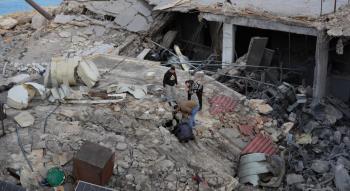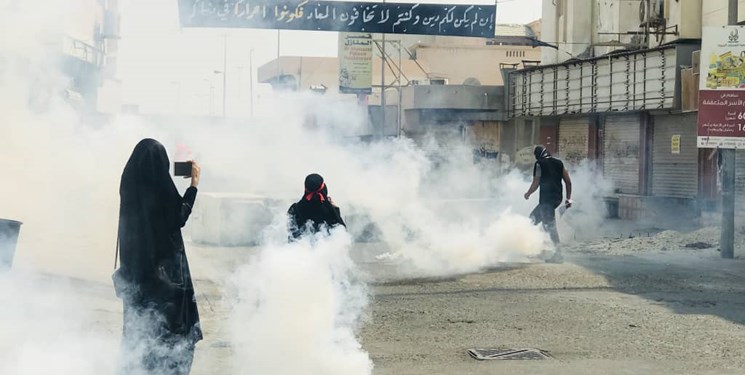Alwaght- In many Muslim and non-Muslim countries the Shiites are allowed to freely mark Ashura day. But the case is paradoxically different when it comes to Bahrain, an Arab country where the Shiites who are in majority are subjected to a violent crackdown of the Al Khalifa security forces for their marking martyrdom of the Prophet Muhammad’s grandson Imam Hussein ibn Ali (PBUH). Since the 2011 uprising, every year the West-backed Bahraini regime in Muharram month tightened the security forces presence and turned the country into a police-controlled castle for the fear of shored up popular protests inspired by Ashura uprising against the oppression.
Crackdown on Shiites as Muharram starts
Since the beginning of Muharram, the Bahraini security forces repeatedly attacked the Ashura ceremonies and destroyed the mourning symbols in various parts of the country. The Al Khalifa regime recalled some 31 Shiite citizens, including 17 preachers, for marking Ashura last week. Sources have said that 11 of them were arrested.
Furthermore, the plain dress mercenaries of the regime attack the Old City and tore up the Ashura posters and flags.
The developments came while recently Khalifa bin Salman Al Khalifa, the state’s premier, in a meeting with the government supporters sought to take a gesture of openness to the Shiites marking the Ashura ceremonies.
However, despite that gesture, In the first ten days of Muharram, the security forces encircled the Daraz neighborhood in the capital Manama and destroyed the facilities belonging to the mourning ceremony. The security forces, for a long time setting up checkpoints in the entry of the neighborhood, tightened their encirclement and attacked the ceremony facilities.
Despite the assault, the Shiites installed posters of Imam Hussein and their spiritual leader Ayatollah Sheikh Isa Qassim.
This is not the first time that the Daraz residents come under such violence. Every year with the arrival of Muharram, the Shiites come under the regime’s intensified pressures as they mark Ashura.
Security forces attack mourners in Ashura day
The Bahraini sources on Thursday, the day of Ashura, said that the security forces attacked the mourners in various parts of the country. The Lulu news network, a broadcaster operated by the Bahraini opposition from Britain, has reported that the regime’s forces assaulted various Muharram ceremonies in various areas like Manama city, Al-Shakhora, Abu Sobaye, Hamad, Isa, Karzakan, Sar, Daraz, Malkiya, Al-Akr, Bouri, and Ma'amir and removed the signs and banners of the ceremony from the streets.
Further outlets reporting from inside Bahrain maintained that the Al Khalifa forces cracked down on and dispersed the Ashura march in the Nuwaudrat village close to Sitra Island, some five kilometers south of Manama. Reports added that since Tassoua, the ninth day of Muharram and a day before Ashura, the government detained a number of preachers in various parts of the tiny island kingdom.
Al Wefaq opposition group reacts to recalls
As the regime summoned some of the clerics during the first ten days of Muharram, the Al Wefaq opposition movement condemned the crackdown and called for the release of the detainees.
Al Wefaq, the biggest Shiite opposition group in the small monarchy, released a statement of condemnation and stated that detention of the preachers and mourners was a blatant violation of the religious freedoms and human rights. The Al Wefaq National Islamic Society said the regime’s desecration of Ashura’s symbols had taken place “in complete ignorance of the sentiments of the island’s Shiite Muslims, who are mourning Imam Hussein’s martyrdom.”
According to the Bahrain Mirror news website, Shiite clerics were arrested for what the kingdom’s Public Prosecutor’s Office called promoting hatred of the ruling regime and encouraging “acts of terrorism.”
According to the news outlet, the prosecutor released some of those recalled after questioning. They were identified as Sheikh Sadiq al-Qorayfi, Sheikh Mahdi al-Karzakani, Sayed Mohiaddin al-Mashaal, Mohammad al-Mola, and Sheikh Bashar al-Aali.
Furthermore, the prominent preacher Sheikh Mohammad al-Rayash was also among those recalled. The website identified the detainees as Sheikh Yasin al-Jamri, Sheikh Hani al-Babaa, Sheikh Mohammad al-Sahlawi, all arrested for the so-called incitement of terrorism against the state.
Bahrain has been a scene to a revolution against the repressive ruling Al Khalifa family since February 14, 2011. The protesters have been calling for freedoms, justice, and a fight against discrimination. Beside release of the political prisoners, they also call for a democratically-elected government to rule them.
The violence so far left dozens of protesters killed and thousands injured. The Al Khalifa since then has revoked citizenship of hundreds of protesters. The rights groups have repeatedly disparaged the regime’s clampdown against the peaceful protesters and called for the king to instead embark on a real political reforms process.
The Amnesty International has recently published a report, saying that since the start of the anti-government uprising, Al Khalifa revoked nationality of some 738 Bahrainis.
Additionally, the Al Wefaq movement in June announced that since the beginning of the protests, 5,098 citizens were subjected to the tortures in the regime’s prisons.



























